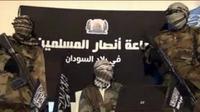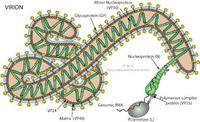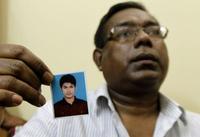-
Nigerian Islamic militants execute seven Western hostages

Ansaru, a Nigerian Islamist militant group which is an off-shoot of Boko Haram, said it has killed seven hostages it captured in the northern Nigeria province of Bauchi last month. The hostages are from Italy, Britain, Greece, and Lebanon.
-
-
June workshop on approaches to CBRNE incidents
NIST-organized workshop will explore ways to improve an all-of-government approach that increases resilience to international chemical, biological, radiological, nuclear, or explosive (CBRNE) incidents.
-
-
Bin Laden's son-in-law captured, will appear in NYC court this morning

Usama bin Laden’s son-in-law, who is one of al Qaeda’s top spokesmen, has been captured overseas and charged in the United States with conspiracy to kill Americans, according to an indictment unsealed Thursday. Administration’s sources said he was apprehended “some time ago,” without giving specifics. Abu Ghaith is dues to appear today (Friday) in a federal court in New York City to face the charges. Some GOP lawmakers criticized his court appearance, saying he should have sent directly to Guantanamo.
-
-
White House cancels award to Egyptian activist after her anti-Semitic tweets come to light
The Obama administration planned on giving Samira Ibrahim, an Egyptian democracy and women-rights activist, an award – she and eight other women were selected to receive the International Women of Courage award from Michelle Obama in a White House ceremony today — but decided to put the whole thing on hold after it has emerged that Ibrahim sent crudely anti-Semitic and anti-American messages to her Twitter followers.
-
-
Senate confirms Brennan for CIA post
The Senate, on a 63-34 vote Thursday afternoon, confirmed John Brennan as the new director of the CIA. The vote came after Senator Rand Paul (R-Kentucky), ended his 13-hour filibuster, saying he was now satisfied with the clarifications by Attorney General Eric Holder regarding the use of drones to kill American citizens. Paul’s tactics divided the Republican caucus, with Senators Lindsey Graham (R-South Carolina) and John McCain (R-Arizona), who spoke on the Senate floor earlier today, mincing no words in denouncing Paul’s quest for clarifications. Paul’s filibuster is the ninth longest filibuster in Senate history.
-
-
Marburg drug shows promise

Marburg hemorrhagic fever is a severe and highly lethal disease with no effective treatments, and it has been classified as a Category A bioterrorism agent by the Centers for Disease Control and Prevention (CDC). Sarepta Therapeutics announced positive results from a non-human primate study of AVI-7288, the company’s lead drug candidate for the treatment of Marburg virus infection.
-
-
Enabling small ships to launch and retrieve long-endurance UAVs
About 98 percent of the world’s land area lies within 900 nautical miles of ocean coastlines. Enabling small ships to launch and retrieve long-endurance UAVs on demand would greatly expand the U.S. military’s situational awareness and ability quickly and flexibly to engage in hotspots over land or water. DARPA is seeking companies to develop these systems.
-
-
Two top North African terrorist leaders killed in north Mali

The two top leaders of the Islamist militant insurgency in North Africa, Mokhtar Belmokhtar and Abdelhamid Abu Zeid, were killed over the weekend by a contingent of Chad soldiers, which are part of the African coalition forces fighting Islamist militants in north Mali. The two Islamist leaders were killed in fighting in the rugged Adrar des Ifoghas mountain range of northeastern Mali, where the Islamists, who had controlled north Mali since April 2012, have escaped after France began its military campaign against them in mid-January.
-
-
Domestic terrorism in France more likely in wake of Mali intervention
Marc Trévidic, France’s most prominent investigative judge dealing with terrorism, warned that the on-going French military intervention in Mali has intensified the threat of terrorist attacks inside France by French citizens of African ancestry. He noted that initially the French security services were mostly concerned with jihadi elements among French citizens of North African Arab ancestry, that is, citizens hailing from Algeria, Morocco, and Tunisia. Now, however, more attention is being paid to potential terrorist threats coming from those French citizens whose ancestry is Mali, Senegal, Nigeria, and Niger.
-
-
Major U.K. terrorism trial ends in three convictions
Irfan Naseer, 31, Irfan Khalid, 27, and Ashik Ali, 27, all from Birmingham, were found guilty at Woolwich Crown Court of being “central figures” in a terrorist plot in which, as suicide bombers, they would have carried out an attack which would rival, in scope and destruction, the 7 July and 9/11 terrorist attacks. The prosecution said the three planned to set off up to eight bombs in rucksacks, using timers to detonate the charges. Detectives believe it is the most significant terror plot to be uncovered since the 2006 conspiracy to blow up transatlantic airliners using bombs disguised as soft drinks.
-
-
Keeping an eye on the world’s dangerous chemicals
In the chemistry labs of the developing world, it is not uncommon to find containers, forgotten on shelves, with only vague clues to their origins. The label, if there is one, is rubbed away. Left alone for years, some chemicals can quietly break down into explosive elixirs, and what was once an innocent experiment by a well-meaning scientist becomes a very real, unsecured threat. Should such chemicals fall into malicious hands, the consequences could be widespread and deadly.
-
-
Iran builds 50,000-strong Syrian Alawite militia for post-Assad era

Officers from the Iranian Revolutionary Guard, aided by scores of Hezbollah officers, have been busy building, equipping, and training a new Alawite militia which will continue to protect Iranian and Hezbollah interests in Syria following the inevitable fall of Assad. The Assad regime already has a paramilitary militia, the shabiha, or “ghost,” units. The shabiha, together with Hezbollah fighters from Lebanon, has concentrated on killing Sunni civilians in villages and towns deep inside Alawaite-majority areas. Syria and Hezbollah, however, have been worried for a while that, at the end, the loyalty of the shabaiha is to the Syrian Alawaite minority and its interest. Iran and Hezbollah want to create a well-armed militia which will be loyal to the interests of Iran and Hezbollah. The new, 50,000-strong militia, called Jaysh fighters, is a purely sectarian fighting force overseen by Iranian and Hezbollah commanders and separate from the shabiha paramilitaries.
-
-
Mali crisis will be the topic of Thursday House Foreign Affairs Committee hearing
The House Foreign Affairs Committee will hold a hearing on Thursday, 14 February, entitled, The Crisis in Mali: U.S. Interests and the International Response. “Today in Mali, you have battle-hardened, al-Qaeda-affiliated militants, armed to the teeth with weapons from Qadhafi’s stockpile, seeking safe haven,” said Representative Ed Royce (R-California), the committee chairman.
-
-
Bangladeshi man pleads guilty to trying to blow up the Federal Reserve Bank building

A Bangladeshi man who triedattempted to use a weapon of mass destruction to blow up the New York Federal Reserve Bank has pleaded guilty to the charges. Under the plea agreement, he will faces up to life in prison.
-
-
Number of Muslim-Americans involved in domestic terrorism “vanishingly small”
The number of Muslim-Americans planning or perpetrating terror plots has always been exceedingly small – and it is declining. Fourteen Muslim-Americans were indicted for violent terrorist plots in 2012, down from twenty-one the year before. For the second year in a row, there were no fatalities or injuries from Muslim-American terrorism. For comparison: the United States suffered approximately 14,000 murders in 2012. Since 9/11, Muslim-American terrorism has claimed thirty-three lives in the United States. During the same period, there were more than 180,000 murders committed in the United States.
-
More headlines
The long view
How Male Grievance Fuels Radicalization and Extremist Violence
Social extremism is evolving in reach and form. While traditional racial supremacy ideologies remain, contemporary movements are now often fueled by something more personal and emotionally resonant: male grievance.
